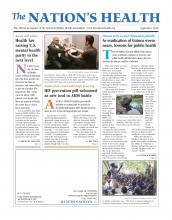More than 40 million Americans suffer from the disease of addiction, but their treatment needs are largely overlooked by a U.S. medical care system that continues to be influenced by unscientific misperceptions about addiction, a recent report finds.
Released in June by the National Center on Addiction and Substance Abuse at Columbia University, the report found that 16 percent of Americans ages 12 and older have addictions involving nicotine, alcohol or other drugs, and another 80 million people are abusing substances in ways that threaten their health and safety. And while more people suffer from the disease of addiction than heart conditions, diabetes or cancer, only about one in 10 addiction sufferers receives treatment. By comparison, seven out of 10 people with diseases such as high blood pressure, major depression and diabetes receive treatment.
The consequences of the medical system’s inattention to the disease of addiction are profound, the report said. As the nation’s largest preventable and most costly health problems, addictions are responsible for more than 20 percent of deaths in the United States. Moreover, addictions cause or contribute to at least 70 other conditions that require medical care, have a wide range of costly social consequences and account for one-third of all hospital in-patient costs.
Contributing to the medical system’s inattention to addiction treatment is a lack of knowledge about the science of addiction, the report said.
“This report shows that misperceptions about the disease of addiction are undermining medical care,” said Drew Altman, PhD, president of the Henry J. Kaiser Family Foundation and chair of the report’s advisory commission.
Although advances in neuroscience, brain imaging and behavioral research clearly show addiction to be a complex brain disease, addiction is “all too often misunderstood as a moral failing, a lack of willpower and a subject of shame and disgust,” the report said. And while health professionals routinely screen their patients for a broad range of health problems such as high blood pressure or high cholesterol, they rarely screen for risky substance use or signs of addiction, the report said. But such inattention eventually falls back in the lap of the health care system in the form of having to treat a long list of resulting health problems, including accidents, unintended pregnancies, heart disease, cancers and many other costly conditions.
The report, “Addiction Medicine: Closing the Gap between Science and Practice,” found that addiction treatment facilities and programs are not adequately regulated or held accountable for providing treatment consistent with medical standards and proven treatment practices. The report provides recommendations to overhaul current intervention and treatment approaches and to bring practice in line with the scientific evidence and with the standard of care for other public health and medical conditions.
“Right now there are no accepted national standards for providers of addiction treatment,” said Susan Foster, MSW, the report’s lead researcher. “There simply is no other disease where appropriate medical treatment is not provided by the health care system and where patients instead must turn to a broad range of practitioners largely exempt from medical standards.”
According to Foster, neglect by the medical profession has resulted in a separate and unrelated system of care that struggles to treat the disease without the resources or knowledge base to keep pace with science and medicine.
The full report is available at www.casacolumbia.org/templates/NewsRoom.aspx?articleid=678&zoneid=51.
- Copyright The Nation’s Health, American Public Health Association









